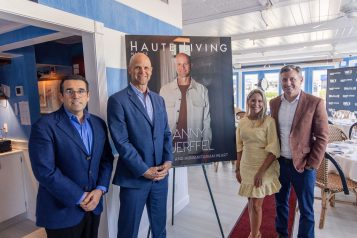In addition to being the chairman and a principal owner of Prudential Douglas Elliman, with Dottie Herman, other titles held by Howard Lorber read like a New York Times best seller list.
By Lauren Price
Photography By Scott Rudd
Is there anything Howard M. Lorber hasn’t done?
In addition to being the chairman and a principal owner of Prudential Douglas Elliman, with Dottie Herman, other titles held by Lorber read like a New York Times best-seller list. He’s the chairman and Chief Executive Officer of Nathan’s Famous Inc., the fast-food company. He’s president and Chief Executive Officer of the Vector Group Ltd., a publicly held diversified holding company listed on the New York Stock Exchange, which indirectly owns Liggett Group Inc., Vector Tobacco Inc., and New Valley LLC. And, he’s the director of United Capital Corp., a real-estate investment and diversified manufacturing company.
And it’s not just in business that Lorber has a pedigree. He holds a bachelor of arts degree in sociology and a master of science degree in taxation from C.W. Post at Long Island University. He has an honorary doctorate from Long Island University and sits on its board of trustees, and is chairman of the school’s investment committee. He has both Chartered Life Underwriter and Chartered Financial Consultant degrees from the American College in Bryn Mawr, Penn.
Closely connected to his alma mater, Lorber contributed nearly $1 million in the mid-1990s to help restore C.W. Post’s Hutton House. The historic Georgian Colonial mansion-the former home of financier E. F. Hutton’s brother-is where Lorber attended accounting classes as a young man. Now known as Lorber Hall, the mansion houses the School of Professional Accountancy.
And this is a man who appeared not only behind the scenes, but in them. Lorber appeared on the small screen in the 2005 Final Three episode of The Apprentice to interview the finalists in the company of honchos from Domino’s, QVC and Burger King.
Married to his college sweetheart and the father of two sons, Lorber is a happy man. Following in his leadership footsteps, his son Michael is one of the principals of Boston Realty Advisors, Greater Boston’s premier brokerage firm. His son, Brian, is a partner at Blue Star Jets, the wildly successful private jet company.
It wouldn’t seem that this native New Yorker would have any spare time, but Lorber makes time for leisure activities, too.
“I really love hunting birds and playing golf, both of which I’m not very good at,” he admits. He mentions that he plays a lot of golf with Trump Sr.-but always loses-and hunts with Trump Jr., who he considers to be quite good. “I also love boating,” he quickly adds.
But, true happiness, Lorber says, are his winters on Fisher Island and his summers in Southampton. Not to say he doesn’t appreciate an adventure in fields afar. Two South African safaris were among his travel highlights.
“The strongest markets right now are Manhattan and the Hamptons. Right now sales are up a few points. But definitely not down, compared to last year.”
“I went with some buddies of mine and I really have to say that for me, it was truly a trip of a lifetime,” he says. “It’s hard to describe that feeling if you haven’t been on a safari, but I can tell you that you’ll never look at animals in the same way again if you go. I’m actually terrified of snakes, so I was always pretty worried I’d run into one. Lucky for me, that didn’t happen.”
It’s a question we had to ask: how does buying a hot dog company fit in with finance and real estate? “For me, it’s about a brand name-and I’m a great believer in brands.”
Childhood memories didn’t come into play? After all, Nathan’s has been a beloved Coney Island institution since 1916.
“When it became a private company in 1987, there was a deal to be made, and I made it,” he says. Now global, there are to date more than 350 franchised and/or licensed Nathan’s units (including locations in Japan, Kuwait, Egypt and Israel), a half-dozen or so company-owned units, including the original on Surf Avenue in Coney Island, and more than 2,000 Nathan’s brand points of sale, including Yankee and Shea stadiums. Nathan’s Famous is also the parent of Kenny Rogers Roasters, Miami Subs and Arthur Treacher’s Fish & Chips.
When asked if the purchase of Douglas Elliman was about the brand, he said, “I’m a true real-estate junkie. I’ve always loved real estate, so I really wanted to make the deal happen … but it certainly was a brand everyone knew, too.”
So, the question begs: how did he get together with Dottie Herman and Douglas Elliman?
“Dottie Herman and I have the same lawyer and I had heard that she was looking for a a new partner,” Lorber explains. “So I became her partner at Prudential Long Island Realty in 2000. Then I found out Andrew Farkas of the Insignia Financial Group was selling Douglas Elliman. Believe it or not, for such a well-known company-it was not doing as well as you’d think when we came along. And when I’m looking at a situation like that, I know there is only one way to go-and that’s up! So it was a win-win as far as I was concerned. That, and the fact that the market began soaring right after the purchase only made it better, sweeter deal.”
At the time, the $71.75 million they spent acquiring the venerable firm was the second highest amount ever paid for a residential brokerage house in Manhattan. (Ironically, it’s topped by Elliman’s sale to Insignia for $75 million in 1999.) Today, there are more than 3,300 salespeople working at nearly 70 offices, producing more than $12 billion in volume annually.
Clearly, Lorber is involved on a daily basis at Prudential Douglas Elliman and, indeed, he brings in quite a few mega deals. “In the last 90 days alone, I’ve been involved in $100 million worth of listings-and I’ll also go along with a broker working on some really big deal to help close it,” he says, adding that he’s also brought in more than $1 billion in new developments.
His relationships with some of the most powerful business leaders doesn’t hurt either. The Trump-Lorber friendship brought in a much-coveted listing for what has been called the most expensive single-family home in the nation by Forbes magazine. Once the Palm Beach home of Abe Gosman, the former head of a health-care company, Trump picked it up at a U.S. Bankruptcy Court auction in 2004, did a multi-million dollar renovation and is now asking $125 million. In addition to 15 bedrooms, the acre-upon-acre property on North Ocean Boulevard (a.k.a. “Billionaire’s Row”) has 475 feet of beachfront, ceilings soaring as high as 40 feet, 16 bathrooms, a 4,100-square foot Venetian-style conservatory, a media room, library, three swimming pools and three very large guest houses.
“I brought in 55 Wall Street [The Cipriani Club Residences], too” he added. “That one was being marketed by our biggest competitor-but I thought it could be more effectively marketed. So I sat down with the developer [Steven Witkoff] and we worked out a deal that was mutually beneficial. Then of course, I brought on Dolly Lenz to head up the project and she brought on Laura Cordovano to head up her team.
“I really do love that project,” says Lorber. “So much so that I bought two units in there right off the bat-clearly demonstrating that I believe in the project. A purchase like that gets a lot of buzz going … gets the word out that the development is so fabulous, even Howard Lorber is buying there.”
Speaking of who’s marketing what and who isn’t anymore, we asked Lorber about the trend of changing marketing firms midstream.
“It takes a lot for a developer to change marketing firms,” he says. “But if the units aren’t selling … then there’s something going on and that something needs to be addressed. Maybe the price per square foot is just too high or an architect’s vision for that particular project isn’t a good fit for that particular neighborhood … or there’s a land-lease [a long term lease to the developer, generally 99 years]. Even low ceilings or oversized units can kill a sale.”
Lorber says he isn’t convinced that bigger is always better when it comes to new luxury developments popping up all over town.
“I’m not really a believer of these very large apartments on the market today. They’re harder to sell and frankly, if a buyer is looking for something bigger, there is always the option to combine. If I’m in on the deal initially, I always suggest keeping the square footage down. I counsel developers to create smaller units and market them as fabulous pieds-a-terre.
On the flip side, Prudential Douglas Elliman recently lost 823 Park to Brown Harris Stevens.
“We had a one-year contract with the developer and it was coming up for renewal. The prices were way too high per square foot in this market, so when our broker sat down with the developer to discuss the renewal, she told him prices probably had to come down since we had only sold one out of the 12 units. He didn’t want to do that, so we weren’t interested in renewing the deal. I always ask these developers, ‘Isn’t it better to initially come out with a lower price per square foot and start selling, or is it better to come out high and sell basically nothing?’ I think that once units start selling, developers will probably find they can up the price per square foot because word has gotten out that the units are quickly selling out. A good example of that is Barbizon 63. Initially, we priced the units at about $1,700 per square foot. We’ve now sold 70 percent of that building and we’ve probably had six price increases since day one. The remaining units are now averaging about $2,000 a square foot.”
All the same, Lorber sees Corcoran as Prudential Douglas Elliman’s biggest competition-indeed, the only competition.
“The two of us have more than 75 percent of the market share here in Manhattan. But here’s where we’re superior. Corcoran is very corporate because they’re owned by NRT [a subsidiary of Cendant, NRT does business under several brand names, including Coldwell Banker, ERA and Sotheby’s International Realty, in addition to The Corcoran Group]. That means it takes longer for them to get something done.”
“For instance, we had offices in the same building [Apple Bank] on the Upper West Side and they gave us less than a year to move out because the building was being converted into condos. Needless to say, we were all scrambling to find a new address for our West Side offices. Pam Liebman [Corcoran’s CEO] found something at 1995 Broadway, which we would have liked to have gotten to first, and began putting the deal together. But after some time went by, I called the landlord to see if anything changed. He told me he was still working with Corcoran, but not getting the deal finalized. So I told him to send a lease over to me and I would get it back to him, signed sealed and delivered the next day. He did and of course, we got that space. I can do things like that; Corcoran really can’t. The way we operate, we can do what we need to do very quickly. I think a brokerage company, no matter how big, should be run like a mom and pop shop.”
To be fair Corcoran fared pretty well after that short rivalry, ending up on the 39th floor at swanky 888 Seventh Avenue.
When asked about expansions on the international horizon for Prudential Douglas Elliman, say, in Dubai, Lorber was not surprisingly vocal.
“We are definitely not going to do anything in Dubai. I’m not sure the market will sustain there, and I think they will ultimately have trouble selling those island countries [at The World]. And there’s another factor. Let’s say I bought a country and one night I want to go into the Dubai City for dinner and by the time I’m ready to head home, it’s close to midnight. How the hell am I going to find my island? It’s dark, hard to see, can’t land in a helicopter. You know what I mean?”
How about closer to home, as Stribling just did in London?
“No, not at all,” he said. “Elizabeth [Stribling] spends a lot of time in Europe, so I can see why she did that. It was also a great way to generate sales for the Plaza Hotel units. My thoughts for expansion are more local. I like the riverfront along the Hudson in New Jersey and I also like what’s going on down at the Jersey Shore.”
Looking to pick up another Manhattan brokerage?
“No…don’t have to, “he says. “I’ll just hire away their best people. When we started out, we asked around as to who had the best Web site, and of course it was Corcoran. So we took away their top techie, and made him our Chief Technology Officer. You know, our new Web site was launched recently, right? Same for when we were looking for the best finance guy around. Again, it was Corcoran’s chief financial officer. Now he’s on board with us.”
Our last question for Lorber was his thoughts as to where the luxury real estate market is heading over the next year or so.
“The strongest markets right now are Manhattan and the Hamptons. Right now sales are up a few points. But definitely not down, compared to last year, which by the way, was a fabulous year for selling real estate in those markets. That’s not the case elsewhere. New York and the Hamptons will continue to thrive because there will always be people with money looking to buy something fabulous in those markets.”
More Lorber Achievements
- Ellis Island Medal of Honor, Medalist
- National Center for Victims of Crime | Chairman
- Practicing Law Institute / Former Faculty Member
- Citizens Advisory Board of the University of Miami / Associate Member
- Peninsula Counseling Center, Nassau County / Director
- Association for Children with Down Syndrome / Advisory Board Member
- Mt. Sinai Medical Center, Miami Beach / Founding Member





















